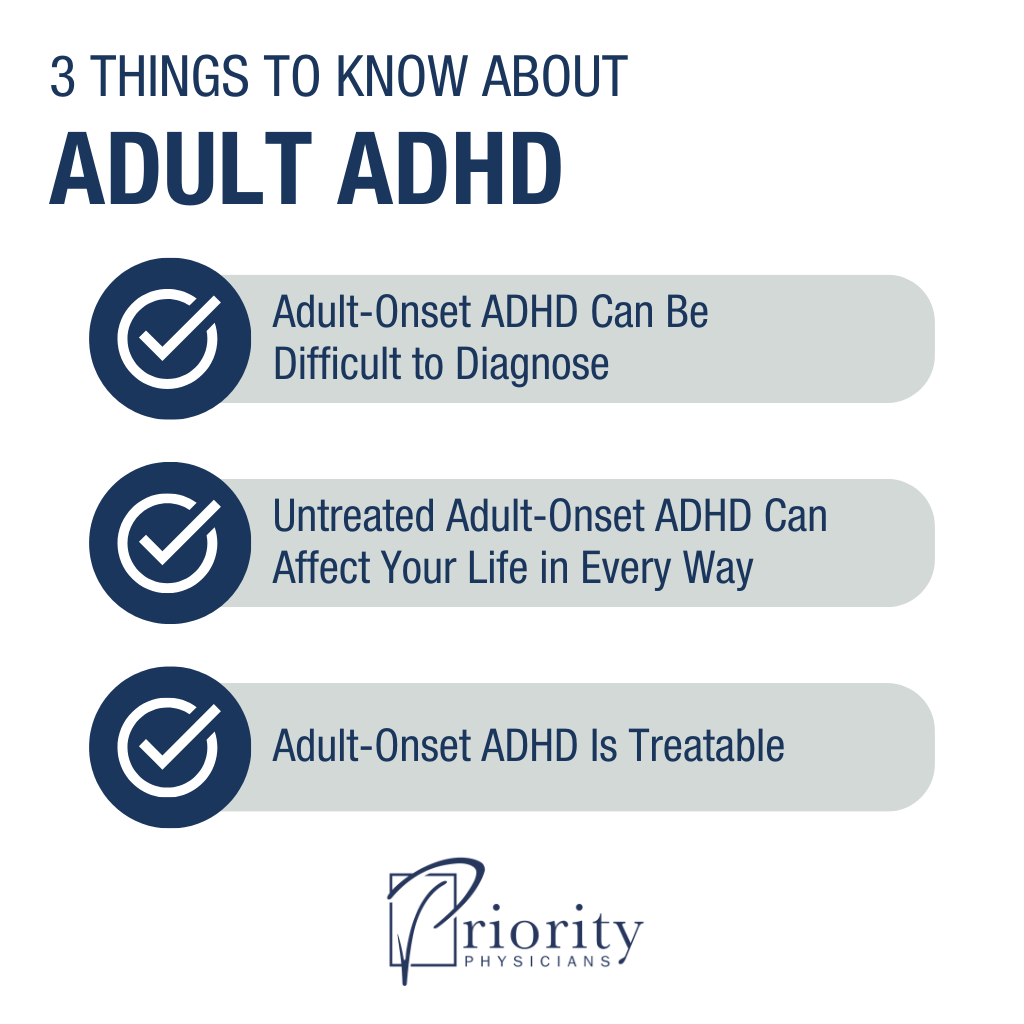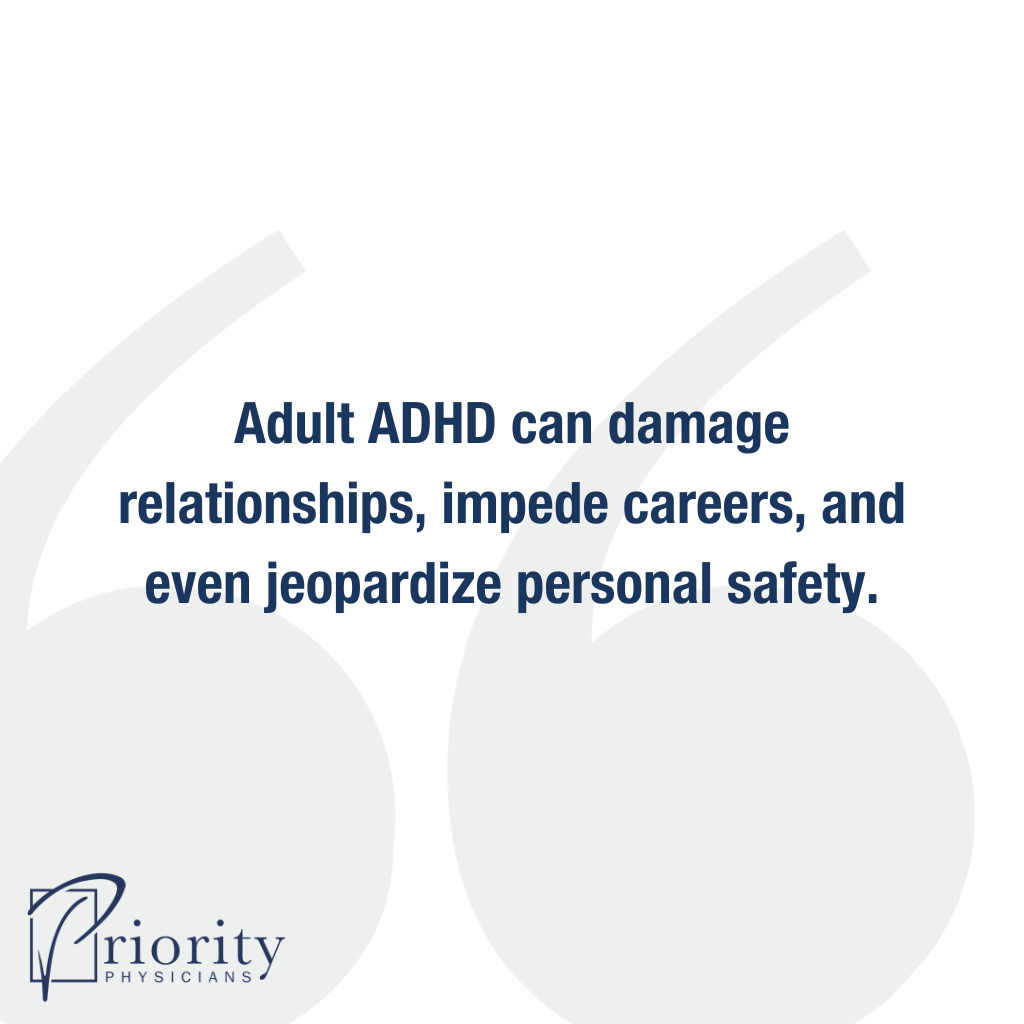How about at work? Do you struggle to focus when there’s noise or activity around you? Do you make careless mistakes during repetitive tasks? Do you struggle to wrap up a project when the hard parts are complete?
If you answered “yes” to several of these questions (or didn’t have the patience to read them all), you may have Adult Attention Deficit/Hyperactivity Disorder (Adult ADHD).
Don’t worry; you’re not alone. About 5% of American adults — or some 8 million people — exhibit the classic symptoms of adult-onset ADHD.
One note: Though we’ve historically called this condition “adult-onset ADHD,” we now believe the ADHD was present — but undiagnosed — in childhood and persisted into adulthood.

Here are three things to know about adult-onset ADHD (or simply adult ADHD):
1. Adult ADHD Can Be Difficult to Diagnose
Maybe you think ADHD is simply a childhood developmental disorder that disappears after age 18. Until about 25 years ago, that’s what the medical community believed, too.
But adult ADHD is real. New research suggests that, for up to 60% of affected kids, their ADHD follows them into adulthood.
Because ADHD is frequently misunderstood in children, many people are never formally diagnosed in youth. That makes their ADHD even harder to identify when they reach adulthood.
In fact, studies suggest that less than 20% of adults with ADHD even know they have it, so they don’t get screened or receive proper treatment. And very few adults who are aware of their ADHD seek help to resolve it.
Research has identified 25–45 different genes related to ADHD. The more of these genes you have, the more likely you are to develop ADHD, and the more severe your case will be.
2. Untreated Adult ADHD Can Affect Your Life in Every Way
If undiagnosed or untreated, ADHD can cause lifelong challenges.
Adults who are continually inattentive, hyperactive, and impulsive are often unable to reach their full potential. Adult ADHD can damage relationships, impede careers, and even jeopardize personal safety.
Untreated, a person with ADHD may find it difficult to be productive, run a business, or complete projects and assignments. They’re often distracted in a marriage or other personal relationships; they jump from thought to thought or action to action; they obsess over inconsequential things; they miss commitments to kids’ activities; and so on.
Often, adults with ADHD are unaware of their disorder (even if they were diagnosed with it in childhood). They may feel they have the same struggles as other adults.
But a time usually comes when someone close to them (maybe even their doctor) points out their hyperactivity or lack of focus.
As adult responsibilities multiply and each day becomes more of a struggle, adult ADHD can begin to affect an individual’s self-view. They might feel they’re lazy, floundering their way through life, and that their options and potential are limited. Perhaps they’re good workers but not as effective as their coworkers — they may feel they’re working as hard as others, yet never get the same results.
It’s not uncommon for adults with ADHD to unknowingly evolve a unique set of coping skills to help them navigate their day (e.g., obsessively taking copious notes to help them remember everything). Some may isolate from others so they can try to concentrate distraction-free.
3. Adult ADHD Is Treatable
If anything here sounds personally familiar, don’t rely solely on your own impressions and feelings. Begin with a conversation. Ask someone who knows you well — your spouse, a friend, or a coworker you trust — if your behavior seems sporadic, consistently over-the-top, or occasionally even inappropriate.
At Priority Physicians, we’re happy to join conversations with you and your family. Our team is trained to detect the signs of ADHD. We can point you to appropriate specialists for screening, treatment strategies, and ongoing ADHD management.
We’ll help you decide if you may benefit from meeting with a therapist, who can use symptom checklists and psychometric testing to determine the extent of your ADHD and guide you toward healthy, effective coping mechanisms to be used alone or in tandem with clinically prescribed medication. Clinical treatment may include the use of a potent, quick-working stimulant medication, such as Ritalin, Vyvanse, Adderall, or Concerta. (Side effects must be carefully monitored.)
Another good reason to discuss ADHD as soon as you suspect it is that it’s highly heritable. One-third to one-half of parents with ADHD will pass the genes along to their children. A conversation with your physician can flag a potential issue early.
When it comes to adult ADHD (“adult-onset ADHD”), we understand that the struggle is real. Reach out to your Priority Physicians team — we’ll guide you down the right path for you and your family.


